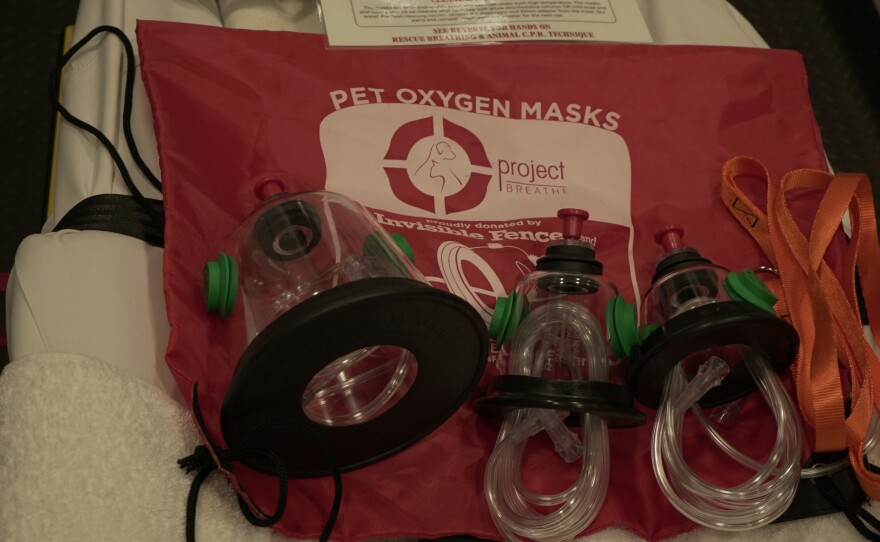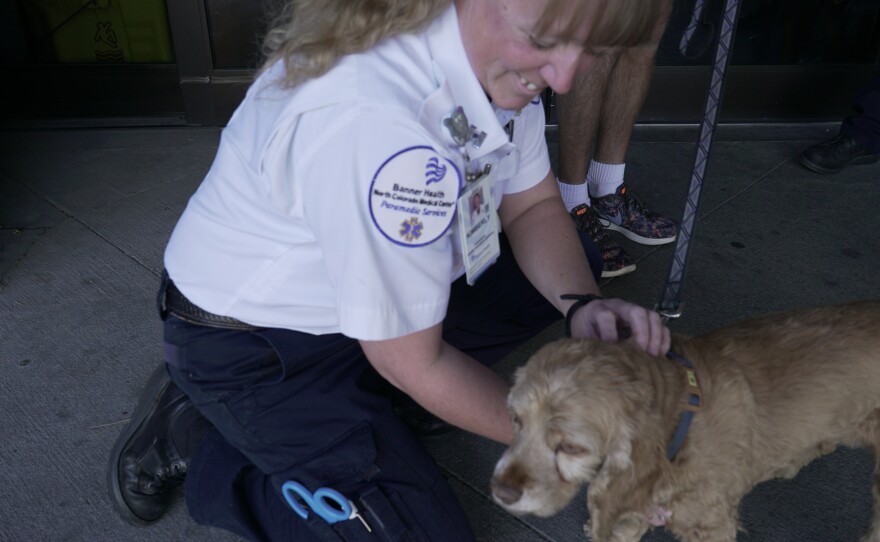Natalie Perry, a paramedic with Banner Health in Greeley, responds to all types of medical emergencies. But she recalled a structure fire where dogs, not people, needed care.
"Animals are brought out and it's kind of a helpless feeling when you don't have the training and knowledge to know what to do," she said.
This and similar experiences prompted Perry to create Project Daphne, a program that provides emergency medical services to household dogs and cats, as well as police dogs.
Previously a K-9 officer with heat exhaustion or injuries would be taken to a veterinarian in the patrol car. But Project Daphne changes this protocol.
"They can treat the police dog on scene and provide him the medical attention he needs and load him up into the ambulance and transport him to the pets' emergency," said Greeley police officer Kevin Clarey of the K-9 unit.
That is what makes Project Daphne unique. While other services focus on immediate treatment, Project Daphne is the first in the country to also transport the animals to a veterinary hospital.

Though Project Daphne officially started in late September, the program is still coming together.
In November, some of Banner's paramedics and emergency medical technicians attended a veterinary CPR and medical skills session to learn skills to specifically treat animals. This training is mandatory before first responders can provide care to dogs and cats.
"They could run into anything -- cats, small dogs, aggressive dogs, you name it," said Dr. Joe Sharrock, assistant medical director at Pets Emergency Hospital, who led the training. "We're trying to go over a lot of the variety of veterinarian medicine."
Seven medical kits specifically designed for pets were donated by Invisible Fence of Northern Colorado and its program. Each kit includes a muzzle, leash, special bandages, clippers and three oxygen masks that fit different size dog snouts.
"Right up my alley."
Greeley resident Walt Francis is a dog lover. During his adult life he's adopted 11 rescue or stray dogs. Now, he has two dogs. One of them is Daphne, a blonde, 30-pound, 12-year-old cocker spaniel.

Francis is retired but stays active by running and walking around his neighborhood. He lives just a couple block from North Colorado Medical Center. He and Daphne like to walk there and rest at the shady ambulance bay. They usually run into EMTs and paramedics transporting patients.Natalie Perry has gotten to know Daphne, Walt and his other dog Simon well.
"We see her all the time. We became friends with not only Walt but his two dogs as well," she said. "It kind of inspired the name, hence Project Daphne."
Francis has a soft spot for first responders himself. He grew up across the street from the medical center and remembers hearing the sirens arriving at the emergency entrance. Fifty years ago when he was studying at the University of Colorado Boulder, he drove for an ambulance company.
Francis has donated to Banner Health in the past, so when Perry told him about the project, he was happy to help.
"It was right up my alley," said Francis. "Something to help dogs and the ambulance companies, so it's a good deal for everybody."
Francis provided the initial funding for the project and will pay for the remaining kits.

"There's actually no cost from Banner Health, no cost from the citizens," said Perry. "Walt donated the funding that we need for equipment, training, mannequins, everything that we need for that."
Humans still come first
If a pet was injured in a car accident or house fire, it used to be illegal for first responders to treat the animal. But in 2014 Gov. John Hickenlooper signed the Pre-Veterinary Care Act allowing them to provide emergency services to animals.
Despite this bill, citizens cannot call 911 just for an injured pet. Human patients still come first.
"It needs to be kind of a specific scenario where there's an injured pet and no injured human or all the injured humans have been cared for," said Perry. "And you have an extra hand."
Perry is excited about the program. Going forward the training will be mandatory for all new hires and she plans to equip all 15 ambulances with pet emergency medical kits.
"It's been something that I've put a lot of work into," said Perry. "It's really working as a team to get stuff done and I love it."








